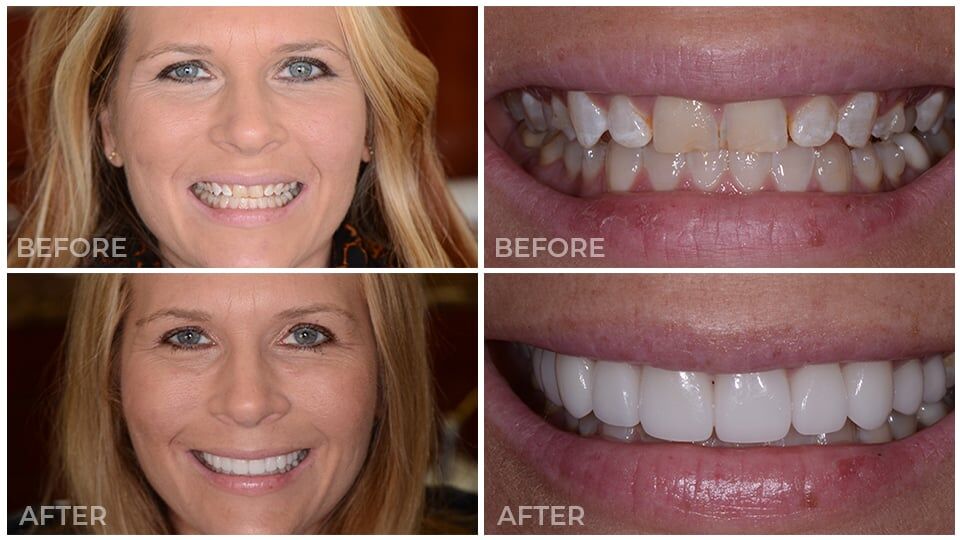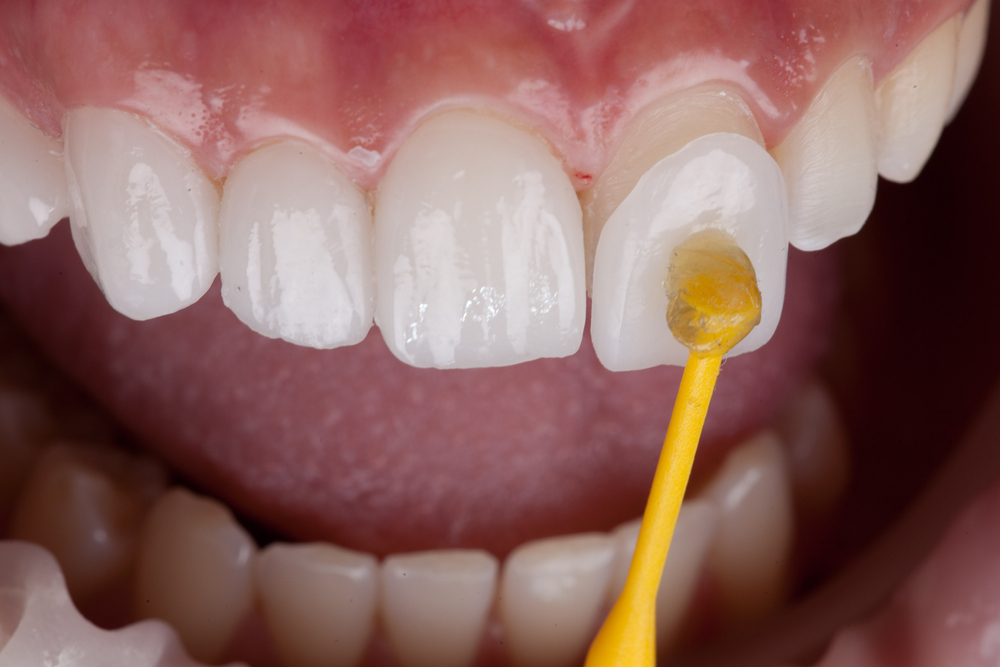Porcelain Veneers: Steps, Benefits, and Long-Term Care Tips
Opening the Tricks of Veneers: Realities, Kinds, and Advantages for a Stunning Smile
Veneers supply a compelling option for those seeking to enhance their smiles. These oral enhancements can resolve numerous flaws, from discoloration to imbalance. With choices like porcelain and composite, people can choose based upon their preferences and demands. However, recognizing the nuances of veneers, including application and care, is crucial. What aspects should one consider before deciding? The responses may amaze those interested in this visual oral choice.

Recognizing Veneers: What Are They?
Veneers are slim, custom-made coverings created to cover the front surface area of teeth, enhancing their appearance. Generally crafted from resilient products, these shells are tailored to fit each person's teeth exactly. They offer numerous objectives, including dealing with aesthetic blemishes such as staining, chips, or spaces. The application procedure includes a dentist preparing the teeth, commonly by removing a tiny quantity of enamel to assure a tight fit. As soon as prepared, the veneers are bound to the teeth using a strong adhesive.
Individuals commonly select veneers for their capability to produce a natural-looking smile while providing a resilient service to dental imperfections. Unlike other aesthetic dentistry choices, veneers require very little invasive treatments, making them a prominent selection. The result is an improved smile that can substantially boost a person's confidence and self-confidence. Generally, veneers offer a reliable approach to attaining a much more unified and eye-catching oral appearance.
Kinds of Veneers: Porcelain vs. Composite
When considering aesthetic dental alternatives, 2 key kinds of veneers stand apart: porcelain and composite. Porcelain veneers are crafted from a long lasting ceramic product that resembles the all-natural look of teeth. They are understood for their stain resistance and ability to show light similarly to all-natural enamel, offering an aesthetic appeal that many individuals wish. The application process typically involves even more prep work of the tooth structure and may require multiple check outs to the dental practitioner.
On the various other hand, composite veneers are made from a tooth-colored resin that is straight applied to the teeth. This type permits for quicker application and can frequently be finished in a single visit. While they are more economical than porcelain veneers, they might not provide the same durability or resistance to discoloration. Eventually, the selection in between porcelain and composite veneers depends on individual choices, budget plan, and details dental demands.
The Advantages of Deciding On Veneers
Choosing veneers offers numerous advantages that can considerably boost both the aesthetics and performance of an individual's smile. Among the primary advantages is their capability to deal with imperfections such as discoloration, gaps, and imbalance, leading to an extra uniform look. Veneers can additionally enhance the durability of teeth, providing a safety layer that shields them from damage.
They require minimal tooth preparation contrasted to other oral procedures, protecting even more of the natural tooth structure. This conservation adds to a healthier oral atmosphere while still attaining a sensational smile.
Veneers are extremely personalized, enabling individuals to choose the form, size, and shade that ideal matches their choices. Furthermore, they are stain-resistant, making it easier to maintain a intense and appealing smile over time. On the whole, veneers offer an effective option for those seeking both aesthetic enhancement and long-term dental wellness benefits.
The Veneer Application Process
The veneer application procedure includes numerous key steps to assure suitable outcomes. An examination is conducted to analyze the client's requirements, followed by the preparation and shaping of the teeth. The veneers are bound in place, with modifications made for an excellent fit and appearance.
Initial Appointment Steps
A thorough preliminary consultation is vital for any person considering veneers, as it establishes the structure for a successful therapy. During this meeting, the dental professional evaluates the person's oral wellness, discussing any kind of existing concerns that might impact the veneer application. This assessment might consist of X-rays and a visual assessment to determine the problem of the gum tissues and teeth.
The dental expert likewise engages the client in a thorough discussion about their visual goals, choices, and assumptions. They may provide different veneer alternatives customized to the client's specific requirements. Additionally, the expert clarifies the treatment, potential threats, and aftercare requirements, guaranteeing that the person is comfortable and knowledgeable before proceeding with the treatment.
Preparation and Forming Teeth
After the first consultation, the next stage includes the preparation and shaping of the teeth to fit the veneers. This important action is done by the dental expert, who thoroughly examines the tooth structure to establish the quantity of enamel that needs to be eliminated. Generally, a slim layer, normally around 0.5 millimeters, is slashed off to assure a proper fit for the veneers. Accuracy is critical throughout this process, as it impacts both the total convenience and the visual result. As soon as the teeth are adequately shaped, impacts are taken to develop customized veneers that straighten perfectly with the client's oral account. This precise preparation sets the stage for a successful veneer application, boosting both look and feature.
Bonding and Final Modifications
Following the shaping and prep work of the teeth, the bonding process begins, marking a critical phase in the veneer application. Throughout this phase, a dental adhesive is used to the prepared tooth surface area, guaranteeing a strong bond in between the tooth and the veneer. The dentist thoroughly places the veneer, making modifications to attain the preferred alignment and looks. When effectively positioned, a special light is made use of to heal the sticky, solidifying the bond. After healing, the dental expert carries out final modifications, cutting any type of excess product and fine-tuning the veneer's form to assure a natural appearance. This cautious attention to information improves both feature and visual appeals, contributing to a total stunning smile that is long-lasting and resilient.
Taking care of Your Veneers: Maintenance Tips
Taking care of veneers is necessary to preserve their look and longevity. A regular day-to-day cleaning routine, mindful evasion of tarnishing foods, and normal dental exams are essential elements of efficient upkeep. These practices assist assure that veneers continue to be in peak condition and remain to enhance one's smile.
Daily Cleaning Routine
Routinely keeping veneers is crucial for their durability and appearance. An appropriate everyday cleansing regimen can assist maintain their sparkle and protect against damage. Dental professionals advise cleaning twice a day with a soft-bristled tooth brush and fluoride tooth paste, making sure that all surface areas are cleaned carefully to prevent damaging the veneer surface. Flossing day-to-day is additionally important to get rid of food fragments and plaque from in between teeth, where brushes might not get to. Furthermore, making use of an antimicrobial mouthwash can help preserve oral hygiene without harming the veneers. It is advisable to prevent rough cleansers and tools that can damage the veneer. By following these straightforward steps, individuals can maintain their veneers looking beautiful while promoting general dental health.
Preventing Discoloration Foods
Veneers are created to enhance the appearance of teeth, their susceptibility to staining requires mindful nutritional choices. It is necessary for individuals with veneers to be conscious of specific foods and drinks that can result in staining. Dark-colored items such as coffee, merlot, and berry juices should be eaten in small amounts, as they are known to tarnish both natural teeth and veneers. Additionally, acidic foods like citrus fruits container weaken the bonding agents utilized in veneers, making them extra prone to staining. To keep a brilliant smile, it is advisable to wash the mouth with water after taking in discoloration foods and to practice regular dental health. These thoughtful selections add considerably to the long life and aesthetic appeals of veneers.

Regular Dental Examinations

Preserving the honesty of veneers calls for a dedication to routine oral examinations, as these appointments play a necessary function in guaranteeing their longevity and appearance. Throughout these sees, oral professionals can examine the problem of the veneers, checking for any indicators of wear, damages, or underlying oral concerns. Additionally, routine cleanings help get rid of plaque and tartar that can gather around the site veneers, advertising overall dental wellness. Dental practitioners can likewise offer personalized guidance on treatment techniques and items matched for veneer maintenance. By sticking to a schedule of examinations, individuals can resolve prospective problems early, ensuring their smile stays lively and stunning. Inevitably, normal oral sees are a vital element of veneer treatment.
Is Veneers the Right Alternative for You?
Choosing whether veneers are the right option commonly rests on individual oral requirements and aesthetic objectives. For those looking for to address problems such as discoloration, chips, or misalignment, veneers can offer a transformative remedy. Prospects commonly include people with healthy and balanced teeth however desire a boosted smile.
Nonetheless, it is vital to think about factors such as tooth enamel problem, the extent of oral issues, and the determination to keep veneers - Porcelain Veneers Dentist. Consulting with an oral expert is important, as they can Home Page examine dental health and figure out if veneers are ideal
Additionally, possible prospects need to review the lasting commitment, as veneers might call for replacement every 10-15 years. Expense factors to consider likewise play a significant role, as veneers can be a considerable financial investment. Eventually, the choice should be well-informed, stabilizing aesthetic desires with functional considerations for long-term results.
Often Asked Inquiries
How Lengthy Do Veneers Commonly Last Before Needing Replacement?
Veneers normally last between 10 to 15 years before needing substitute. Factors such as oral hygiene, way of life options, and material top quality can affect their long life, making routine dental exams necessary for maintaining their condition.
Are Veneers Safe for Individuals With Delicate Teeth?
Veneers can be risk-free for individuals with delicate teeth, but it usually relies on the seriousness of sensitivity and the dentist's method. Consulting an oral specialist prior to continuing is important to assure excellent outcomes.
Can Veneers Be Removed or Changed Conveniently?

Do Veneers Discoloration Gradually, and How Can I Stop It?
Veneers can stain in time, specifically from foods and drinks like coffee or red wine. To avoid staining, preserving great dental hygiene, using a straw for beverages, and normal oral cleansings are advised practices.
What Is the Price Array for Obtaining Veneers?
The expense of veneers typically ranges from $500 to $2,500 per tooth, relying on variables such as product type, dentist click this experience, and place. People must talk to oral experts for customized quotes and financing options.
Once the teeth are adequately shaped, perceptions are taken to create customized veneers that straighten flawlessly with the patient's oral profile. Throughout this phase, an oral adhesive is applied to the prepared tooth surface area, assuring a solid bond between the veneer and the tooth. It is crucial to take into account factors such as tooth enamel problem, the degree of dental concerns, and the willingness to keep veneers. Veneers can be risk-free for individuals with delicate teeth, yet it usually depends on the intensity of sensitivity and the dental practitioner's strategy. The expense of veneers generally varies from $500 to $2,500 per tooth, depending on aspects such as product type, dentist experience, and location.